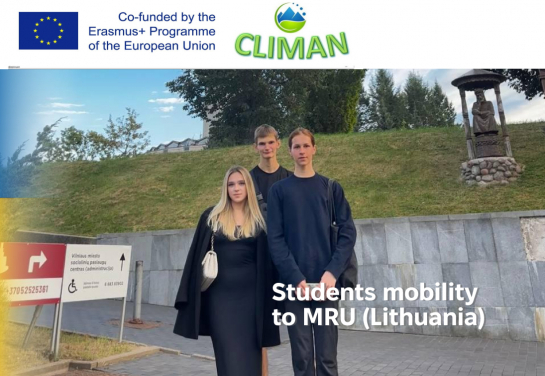 KROK University
KROK University
KROK University
KROK University
From September 2 to 13, 2024, a group of students from the Professional College participated in a two-week training program at Mykolas Romeris University (Lithuania) as part of the Erasmus+ KA2 project “Synergy of Educational, Scientific, Managerial, and Industrial Components for Climate Management and Climate Change Prevention” (CLIMAN). The program aimed to deepen the understanding of global climate change and the role of stakeholders in achieving sustainable development goals. The training included lectures, practical sessions, and field research, allowing participants to combine theoretical knowledge with hands-on experience.
Week 1: Urbanism and Climate Challenges
The first week began with lectures by Professor Paulo Pereira on global climate change. Throughout the week, students explored issues related to urbanization and the impact of climate change on coastal areas and tourism. Seminars on land-use changes in urban areas sparked active discussions among participants. The highlight of the week was a field trip to Vingis Park, where students studied the role of green spaces in mitigating the effects of climate change.
Week 2: Advanced Knowledge and Practical Research
The second week focused on a detailed study of sustainable development goals and the involvement of stakeholders in climate management. A key part of the week was a field study in the Dzūkija National Park, where students had the opportunity to assess the importance of ecosystem preservation firsthand. Lectures on ecosystem services in urban green spaces, as well as seminars on public perceptions of these issues, enhanced the participants' understanding of climate management at the local level.
Throughout the two weeks, students actively participated in practical sessions, discussions, and group projects. The program concluded with project presentations, where each group showcased the results of their research and proposed solutions for sustainable development in the context of climate change.
Learning Outcomes
The training in Lithuania was a crucial step in the professional development of the students. Lectures by leading experts and participation in practical research not only deepened their knowledge of climate change but also taught them how to apply this knowledge in practice. Interaction with peers from different countries helped students grasp the global nature of climate challenges and the importance of international cooperation.
This course not only provided new knowledge but also motivated the students to continue their research in the fields of sustainable development and climate management.
Contact Information
- 30-32 Tabirna St, 03113, Kyiv, Ukraine
- Tel.: +38 044 455-69-86
- Email: [email protected]








